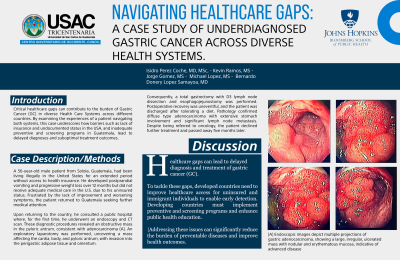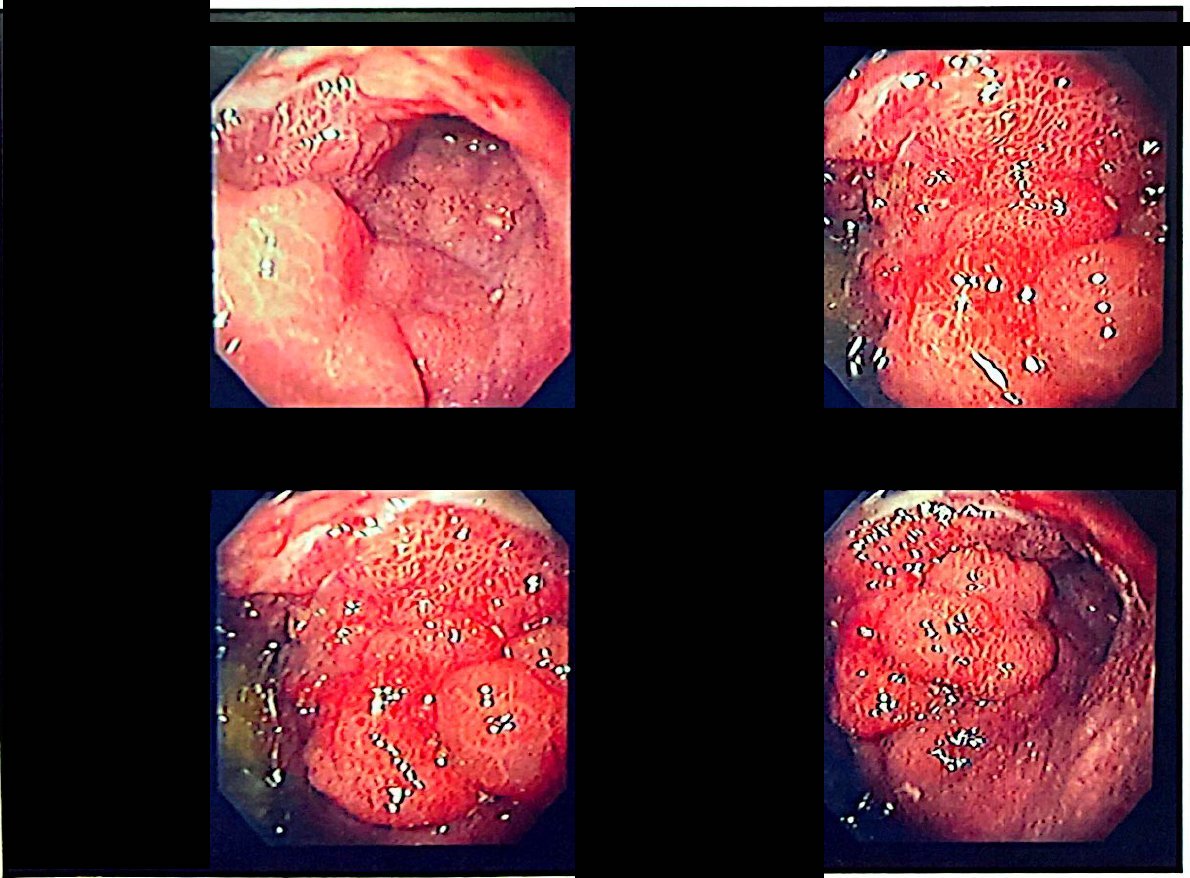Monday Poster Session
Category: Stomach
P3383 - Navigating Healthcare Gaps: A Case Study of Underdiagnosed Gastric Cancer Across Diverse Health Systems
Monday, October 28, 2024
10:30 AM - 4:00 PM ET
Location: Exhibit Hall E

Has Audio
- IP
Isidro Pérez Coché, MD, MSc
Hospital Regional de Occidente at the University of San Carlos de Guatemala
Quetzaltenango, Quetzaltenango, Guatemala
Presenting Author(s)
Isidro Perez Coche, MD, MSc1, Kevin Ramos, MS2, Jorge Gomez, MS3, Michael Lopez, MS2, Bernardo Donery Lopez Samayoa, MD4
1Hospital Regional de Occidente at the University of San Carlos de Guatemala, Quetzaltenango, Quetzaltenango, Guatemala; 2Centro Universitario de Occidente School of Medicine at the University of San Carlos de Guatemala, Quetzaltenango, Quetzaltenango, Guatemala; 3Hospital Regional de Occidente, Quetzaltenango, Quetzaltenango, Guatemala; 4Johns Hopkins Bloomberg School of Public Health, Baltimore, MD
Introduction: Critical healthcare gaps can contribute to the burden of Gastric Cancer (GC) in diverse Health Care Systems across different countries. By examining the experiences of a patient navigating both systems, this case underscores how barriers such as lack of insurance and undocumented status in the USA, and inadequate preventive and screening programs in Guatemala, lead to delayed diagnoses and suboptimal treatment outcomes.
Case Description/Methods: A 56-year-old male patient from Solola, Guatemala, had been living illegally in the United States for an extended period without access to health insurance. He developed postprandial vomiting and progressive weight loss over 12 months but did not receive adequate medical care in the U.S. due to his uninsured status. Frustrated by the lack of improvement and worsening symptoms, the patient returned to Guatemala seeking further medical attention.
Upon returning to the country, he consulted a public hospital where, for the first time, he underwent an endoscopy and CT scan. These diagnostic procedures revealed an obstructive mass in the pyloric antrum, consistent with adenocarcinoma (A). An exploratory laparotomy was performed, uncovering a mass affecting the cardia, body, and pyloric antrum, with invasion into the perigastric adipose tissue and omentum. Consequently, a total gastrectomy with D3 lymph node dissection and esophagojejunostomy was performed. Postoperative recovery was uneventful, and the patient was discharged after tolerating a diet. Pathology confirmed diffuse type adenocarcinoma with extensive stomach involvement and significant lymph node metastasis. Despite being referred to oncology, the patient declined further treatment and passed away five months later.
Discussion: Healthcare gaps can lead to delayed diagnosis and treatment of gastric cancer (GC). To tackle these gaps, developed countries need to improve healthcare access for uninsured and immigrant individuals to enable early detection. Developing countries must implement preventive and screening programs and enhance public health education. Addressing these issues can significantly reduce the burden of preventable diseases and improve health outcomes.

Disclosures:
Isidro Perez Coche, MD, MSc1, Kevin Ramos, MS2, Jorge Gomez, MS3, Michael Lopez, MS2, Bernardo Donery Lopez Samayoa, MD4. P3383 - Navigating Healthcare Gaps: A Case Study of Underdiagnosed Gastric Cancer Across Diverse Health Systems, ACG 2024 Annual Scientific Meeting Abstracts. Philadelphia, PA: American College of Gastroenterology.
1Hospital Regional de Occidente at the University of San Carlos de Guatemala, Quetzaltenango, Quetzaltenango, Guatemala; 2Centro Universitario de Occidente School of Medicine at the University of San Carlos de Guatemala, Quetzaltenango, Quetzaltenango, Guatemala; 3Hospital Regional de Occidente, Quetzaltenango, Quetzaltenango, Guatemala; 4Johns Hopkins Bloomberg School of Public Health, Baltimore, MD
Introduction: Critical healthcare gaps can contribute to the burden of Gastric Cancer (GC) in diverse Health Care Systems across different countries. By examining the experiences of a patient navigating both systems, this case underscores how barriers such as lack of insurance and undocumented status in the USA, and inadequate preventive and screening programs in Guatemala, lead to delayed diagnoses and suboptimal treatment outcomes.
Case Description/Methods: A 56-year-old male patient from Solola, Guatemala, had been living illegally in the United States for an extended period without access to health insurance. He developed postprandial vomiting and progressive weight loss over 12 months but did not receive adequate medical care in the U.S. due to his uninsured status. Frustrated by the lack of improvement and worsening symptoms, the patient returned to Guatemala seeking further medical attention.
Upon returning to the country, he consulted a public hospital where, for the first time, he underwent an endoscopy and CT scan. These diagnostic procedures revealed an obstructive mass in the pyloric antrum, consistent with adenocarcinoma (A). An exploratory laparotomy was performed, uncovering a mass affecting the cardia, body, and pyloric antrum, with invasion into the perigastric adipose tissue and omentum. Consequently, a total gastrectomy with D3 lymph node dissection and esophagojejunostomy was performed. Postoperative recovery was uneventful, and the patient was discharged after tolerating a diet. Pathology confirmed diffuse type adenocarcinoma with extensive stomach involvement and significant lymph node metastasis. Despite being referred to oncology, the patient declined further treatment and passed away five months later.
Discussion: Healthcare gaps can lead to delayed diagnosis and treatment of gastric cancer (GC). To tackle these gaps, developed countries need to improve healthcare access for uninsured and immigrant individuals to enable early detection. Developing countries must implement preventive and screening programs and enhance public health education. Addressing these issues can significantly reduce the burden of preventable diseases and improve health outcomes.

Figure: (A) Endoscopic images depict multiple projections of gastric adenocarcinoma, showing a large, irregular, ulcerated mass with nodular and erythematous mucosa, indicative of advanced disease.
Disclosures:
Isidro Perez Coche indicated no relevant financial relationships.
Kevin Ramos indicated no relevant financial relationships.
Jorge Gomez indicated no relevant financial relationships.
Michael Lopez indicated no relevant financial relationships.
Bernardo Donery Lopez Samayoa indicated no relevant financial relationships.
Isidro Perez Coche, MD, MSc1, Kevin Ramos, MS2, Jorge Gomez, MS3, Michael Lopez, MS2, Bernardo Donery Lopez Samayoa, MD4. P3383 - Navigating Healthcare Gaps: A Case Study of Underdiagnosed Gastric Cancer Across Diverse Health Systems, ACG 2024 Annual Scientific Meeting Abstracts. Philadelphia, PA: American College of Gastroenterology.
